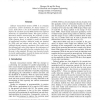Free Online Productivity Tools
i2Speak
i2Symbol
i2OCR
iTex2Img
iWeb2Print
iWeb2Shot
i2Type
iPdf2Split
iPdf2Merge
i2Bopomofo
i2Arabic
i2Style
i2Image
i2PDF
iLatex2Rtf
Sci2ools
HIPC
2009
Springer
2009
Springer
Impact of early abort mechanisms on lock-based software transactional memory
Software transactional memory (STM) is an emerging concurrency control mechanism for shared memory accesses. Early abort is one of the important techniques to improve the execution speed of STMs and has been explored intensively via experimental studies. This paper presents a theoretical analysis characterizing the properties of early abort and its impact on the performance of lock-based STMs. Queuing theory is adopted to model the behaviors of transactional execution. Analytical results are obtained for STMs with and without early abort. The analysis is validated through extensive experiments. Our results reveal that although early abort helps improve the performance of lock-based STMs especially when the contention level is low, the gain is often marginal. We expect our theoretical results to provide useful guidance towards the design and selection of appropriate lock-based STM schemes.
Concurrency Control Mechanism | Distributed And Parallel Computing | HIPC 2009 | Lock-based Stm | Software Transactional Memory |
| Added | 18 Feb 2011 |
| Updated | 18 Feb 2011 |
| Type | Journal |
| Year | 2009 |
| Where | HIPC |
| Authors | Zhengyu He, Bo Hong |
Comments (0)

